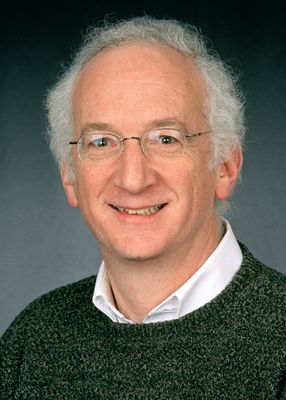Frank Tompa
When a leading authority on the development of the English language
wanted to make its 138-pound Oxford English Dictionary available
online, Waterloo’s renowned computer scientist Frank Tompa was called.
Professor Tompa and his colleagues at the University of Waterloo were researching electronic database search engines in 1984, when Oxford University Press asked them to develop software that would allow people to search an electronic version of the voluminous dictionary.
“In computer science, as in all sciences, you always try to solve the more general problems,” Tompa said once. “The Oxford University Press had a specific problem. We used that to solve a general problem.”
The programmes designed by Tompa and his colleague Gaston Gonnet allow people to compile information that would otherwise take months or years. For example, “It would be relatively straightforward to compile dictionaries for distinct historical periods, to produce something, say, that would present only the vocabulary available to Shakespeare,” he explained once. “The same thing could be done with reference to important legal documents, pointing out what the words of the laws actually meant at the time they were written.”
When the innovative project was completed, Tompa went on to co-found Open Text Corporation in 1991, a high-tech company that sold the new software to industry. At the time, Tompa called UW’s computer science department a “greenhouse” where new ideas could be developed that had applications in the business world. “The environment at Waterloo is one that says education and research can work to the benefit of industry.”
Open Text, which today employs 2,000 people, was established the same year Tompa was named a “leader in Canadian Science” by the Natural Sciences and Engineering Research Council of Canada (NSERC).
In 2006, Open Text officially cut the ribbon on its headquarters at UW’s Research and Technology Park, on a new street called Frank Tompa Drive.
Tompa continues to teach at the University’s David R. Cheriton School of Computer Science. His latest pursuit is developing software that can search video material as well as text. He has been recognized with many awards including a Mathematics Faculty Fellowship for the national and international attention his work has garnered.
Tompa graduated from Brown University in 1970 with a graduate degree in applied mathematics, before going on to complete his PhD in computer science at the University of Toronto in 1974. He began teaching at the UW faculty of computer science later the same year.
His research continues in the fields of data structures and databases and he serves on the University’s Database Research Group. A consummate scientist, Frank Tompa quotes the fictional character Arthur Conan Doyle from the Adventures of Sherlock Holmes on his university home page: “I have no data yet. It is a capital mistake to theorize before one has data.”
Photo courtesy of Frank Tompa
Frank Tompa (Waterloo 150 Profile)
Description
- Creator
- Gallagher, Beth, Author
- Media Type
- Text
- Image
- Description
- To celebrate Waterloo's 150th anniversary, the Waterloo Public Library published a book called "Profiles from the Past, Faces of the Future." This book featured 150 profiles of people who helped make Waterloo what it is today. This is the digitized profile for Frank Tompa.
- Notes
- Please visit the Waterloo Public Library to enquire about physical copies of "Profiles from the Past, Faces of the Future."
The Waterloo 150 project was funded by a grant from the Waterloo Regional Heritage Foundation. Beth Gallagher wrote the profiles with the assistance of many research volunteers. Information for the profiles was gathered from a variety of sources from the community and the Ellis Little Local History Room. Notable sources include the Ellis Little Papers, newspaper clippings, local magazines and books.
- Place of Publication
- Waterloo, Ontario
- Date of Publication
- 2007
- Subject(s)
- Personal Name(s)
- Tompa, Frank ; Gonnet, Gaston
- Corporate Name(s)
- Open Text
- Language of Item
- English
- Geographic Coverage
-
-
Ontario, Canada
Latitude: 43.4668 Longitude: -80.51639
-
- Copyright Statement
- Uses other than research or private study require the permission of the rightsholder(s). Responsibility for obtaining permissions and for any use rests exclusively with the user.
- Contact
- Waterloo Public LibraryEmail:askus@wpl.ca
Website:
Agency street/mail address:35 Albert Street, Waterloo, Ontario, Canada, N2L 5E2
- Full Text




